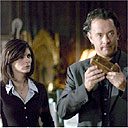
A US federal court has decided that Dan Brown did not plagiarise an existing work when he wrote The Da Vinci Code.
The decision by the 2nd US Circuit Court of Appeals upholds an earlier finding by New York judge George B Daniels in August 2005, which said that Brown did not copy the basic premise of Lewis Perdue's 2000 novel Daughter of God.
It is the latest vindication for the bestselling Brown, whose books have been translated into more than 25 languages and sold tens of millions of copies.
Two weeks ago High Court judges in London held that Brown's publisher Random House had not copied a 1982 book, The Holy Blood and the Holy Grail.
In his 2005 US case, Perdue claimed that Brown lifted his idea of a "divine feminine" - one of the principal notions in The Da Vinci Code.
Perdue unsuccessfully applied to the court to block sales of the bestseller. Rejecting this, the federal judges said that while both novels told stories of faith and events, there were significant differences in the factual details.
However, Brown isn't quite out of the woods yet. He faces a new plagiarism claim from Russian art historian Mikhail Anikin.
Sony's film version will open Cannes on May 17 and plays out of competition. Tom Hanks stars with Audrey Tautou and Paul Betttany.

